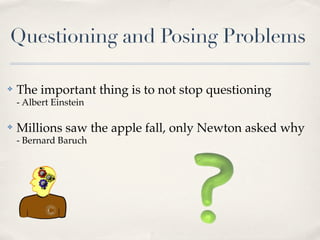Questioning for Staff
- 1. Questioning and Posing Problems ‚ú§ The important thing is to not stop questioning - Albert Einstein ‚ú§ Millions saw the apple fall, only Newton asked why - Bernard Baruch
- 3. As teachers we ask lots of questions ...
- 4. Types of questions: ✤ What’s the capital of Spain? ✤ What were Cliff Richard’s 5 Christmas number 1s? ✤ Do you believe in God? ✤ Why do cats purr? ✤ Why does chocolate taste so good? ✤ What are the alternatives to violent protests? ✤ If it’s cold today, then why doesn’t it snow ?
- 5. Make up your own:
- 6. Make up your own: ‚ú§ To check factual knowledge
- 7. Make up your own: ‚ú§ To check factual knowledge ‚ú§ To look for alternative values / beliefs / opinions
- 8. Make up your own: ‚ú§ To check factual knowledge ‚ú§ To look for alternative values / beliefs / opinions ‚ú§ To look for connections or relationships between things
- 9. Make up your own: ‚ú§ To check factual knowledge ‚ú§ To look for alternative values / beliefs / opinions ‚ú§ To look for connections or relationships between things ‚ú§ To pose a hypothetical problem (what if?)
- 10. Make up your own: ✤ To check factual knowledge ✤ To look for alternative values / beliefs / opinions ✤ To look for connections or relationships between things ✤ To pose a hypothetical problem (what if?) ✤ To recognise discrepancies and phenomena and find out their causes
Editor's Notes
- \n
- \n
- \n
- \n
- \n
- \n
- \n
- \n
- \n
- \n










